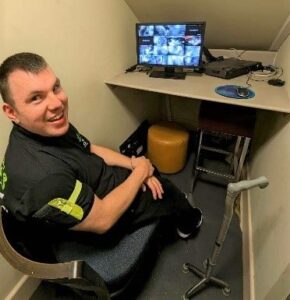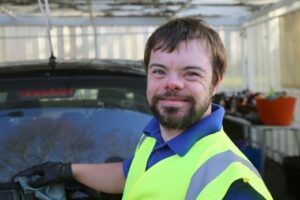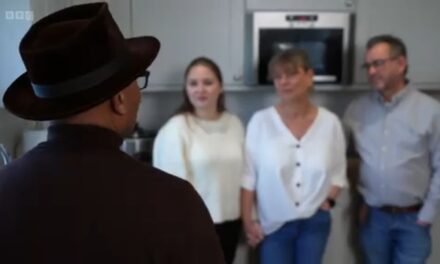Written by Chandra Fifield.
It’s World Autism Acceptance Week (27th March – 2nd April) which aims to raise awareness of autistic people and to help make the world friendlier to those on the autistic spectrum.
Autistic professionals are up to 140% more productive than a neurotypical employee when properly matched to a job that fits their skills — which can include creative thinking, problem solving and excellent attention to detail.
To celebrate the week, we’ve rounded up first-hand accounts of day-to-day life and employment from some autistic people and their families we’ve supported in East Sussex. We’re also sharing information on local events taking place to celebrate the week, useful resources to help you find out more about autism, and how to access support.
Calvin

Calvin is autistic and works for training provider etc Sussex, in Hastings. He describes his route into employment:
“I graduated with a degree in web design during the economic recession. I was unemployed for about a year, and then worked for my old university on a short-term contract as IT tech support for Student Services. I was then unemployed for 4-5 years but started volunteering for a non-profit learning centre called Horizons. At that point, East Sussex County Council had funding to support companies hiring disabled people. This funding was key for me at the time. It came with mentoring support, so I got mentoring in-house from a teacher there, and external mentoring in tech support which taught me a lot of my customer service skills.
“Through that, Horizons were able to employ me as an IT technician. Whilst doing that I started running an IT drop-in, similar to what I do now, and Horizons saw the value of me as a tutor so invested in getting me certified in a Level 3 education and training award, alongside other qualifications such as mental health and first aid. When that organisation closed, I started working elsewhere as an IT technician before I went back to university to do my PGCE, as I wanted to teach. I started working at etc Sussex as a sessional tutor, and was given more and more project work until I became one of their go-to guys for technology support and projects.”
“My main stand-out strength is attention to detail. Which is great if you need good research of information on a topic. I am highly meticulous and will make sure that all I’s are dotted and T’s are crossed in every policy or procedure. I am highly organised, nothing stays in my inbox more than a day without action.
“As for what I’d like to do in the future, it’s to keep doing what I’m doing. I love it so much and I’m not interested in working anywhere else.”
Callum

Callum has learning disabilities and is autistic. He is a security worker at Millie’s Disco in Hastings. He explains how East Sussex County Council’s Steps To Work programme has helped him.
“I wanted to work in security for a long time. I got my security qualifications but wasn’t able to use them because I couldn’t find a job. I’d get frustrated waiting for people – I put myself out there offering work and no one would get back to me. I came to Steps To Work who’ve honestly been brilliant. They helped me get responses from employers. Before that, I’d been looking and applying for at least two years.
“My job coach at Steps To Work encouraged me to approach Millie’s Disco. I wasn’t that confident chasing people up, I’d just wait for ages. But Steps To Work chased them for me and got me a work trial. They helped me with the interview and everything. Plus they spoke to them about me getting my security licence, and helped with that.”
“It’s a sweet job. I like doing the CCTV checks because it’s been a huge learning curve. I learnt about the whole protection system and about health and safety and there is a massive amount involved. I really like zooming in on the cameras. I call the CCTV room my private office because it’s what I do the most of! I love my job – I love talking to club members and I’ve made friends there. People respect me.”
Alex

Alex works as a team member at Cineworld in Eastbourne. He has learning disabilities and is autistic. He and his job coach from Steps To Work, Andrea, explain his route into employment:
Andrea: “Alex wanted to do a customer facing job, initially we applied for waiting staff and bar work. We spent time dropping CVs into hotels and spoke to the Congress Theatre in Eastbourne. Alex told us he loved movies, which is when we applied for Cineworld. Alex previously worked at a car valeting company where he learnt customer service skills, his skills were easily transferrable.”

Andrea, Steps to Work coach
Alex: “I met with Andrea and the cinema manager to discuss the role at the cinema. They helped me apply and do my induction. It was very good.”
Andrea: “It’s been fed back by his managers and his colleagues that Alex is bubbly, has an infectious smile and is very welcoming. With his caring nature, he just wants to make sure everyone is happy.”
Alex: “For the future, I’d like to stay at Cineworld, I love my job!”
Alison and Ellen

Alison
Alison lives in Rother. Along with her husband David, she is a carer for their adult daughter Ellen, who is autistic, diabetic and has Down Syndrome. Alison discusses daily life for her and her husband as carers, and the support they receive — as well as challenges they face.
“Ellen is 32 years old, has Down Syndrome, type 1 diabetes and is also autistic. Although when you look at Ellen you see her Down Syndrome, it is her autism that directs her behaviour. She has challenging behaviours including quite a lot of demand avoidance. She has rituals, very set routines, she doesn’t like loud noises or crowded places. A lot of people with Down Syndrome are really sociable, but she isn’t and prefers to be at home, although she interacts well with staff at her day centre.”
“On a typical day I get Ellen up and ready. Ellen doesn’t like transition from one setting to another, so we need to build in time into everything we do to support her. For example, it can take an hour for Ellen to get into the car. Ellen attends Aspens day centre in Battle on weekdays, where she is engaged in a range of activities supported by staff on a one-to-one basis.
“During the evening it is very difficult to engage Ellen in activities at home so she tends to come in, have a snack, and then watches her favourite DVDs before dinner and bed. On the weekends, we try and get Ellen out for a walk because exercise is important to help manage her diabetes. However, because of her tendency towards demand avoidance it has, particularly since the pandemic, been really difficult to get her to go out. Ellen requires supervision for all day-to-day tasks, and managing her medical needs in relation to her diabetes is a major part of her care, as it includes four injections a day and regular blood tests.”
“We really value the respite care Ellen has from East Sussex County Council, to enable us to have a break. We have previously tried getting a carer to support with some overnight care at home but it didn’t work out because people were anxious about Ellen’s diabetes care needs. It does mean that if you want to go out for an evening you can’t unless it coincides with a respite date. This inflexibility can make life difficult for us.”
“The support we receive through Aspens day centre and the respite care make it possible for Ellen to continue to live at home. It also gives her opportunities beyond what we can provide and so extends her world beyond the four walls of our home.
“We would like to keep Ellen at home with us for as long as possible. But it is really difficult to plan for the future. Our hope is that Ellen will find somewhere to live where she will be as loved and cared for as she is currently.”

Ellen
Find out more
We’ve rounded up some further reading, resources, and information to help you find out more about autism and how to access support:
Local organisations and events
Little Gate Farm work with families and businesses to support adults with learning disabilities and autism into employment, giving them the support they need to learn the role, adapt to their new workplace and become a real asset to their employer. They also host clubs for children aged 8 to 18. They are hosting a World Autism Acceptance Day Walk and Celebration on Sunday 2nd April on Hastings seafront.
Aspens offers a wide range of services for adults with learning disabilities, those on the autism spectrum and those with complex needs. It is holding an open day at its Roebuck Day Centre site as part of Autism Acceptance Week on Wednesday 29th March from 10:30am-2:30pm. Contact paula.taylor@aspens.co.uk for more information.
Support for parents and carers of autistic children
The East Sussex Local Offer is a website and directory which provides information about what support is available for children and young people with Special Educational Needs and Disabilities (SEND), and their families.
CLASS+ is an East Sussex County Council service offered to families with children aged 5–16 with autism. The service offers telephone advice and guidance, coffee mornings, workshops and short-term support at home. Supporting materials and useful resources are available on its Facebook page. CLASS+ for East Sussex – Communication, Learning and Autism Support Service | Facebook
Amaze helps families with disabled children and young people in Sussex. Details of parent carer peer support groups can be found here, with a Heathfield group coming soon.
Training
The Oliver McGowan Training on Learning Disability and Autism is national standardised free training available through the elearning for health website. This 90 minutes online learning session is aimed at health and care staff, but a very useful introduction for anyone wanting to increase their general awareness about the support autistic people and people with learning disabilities may need.
Websites
The National Autistic Society:




